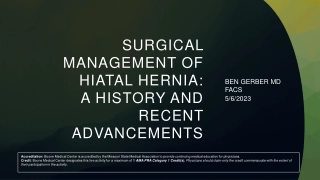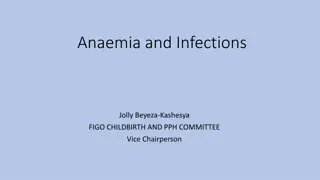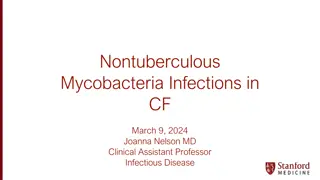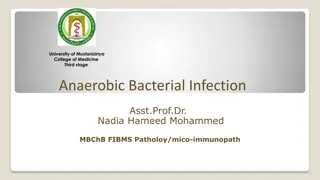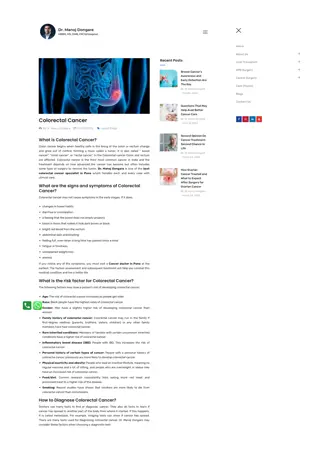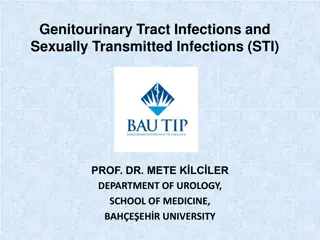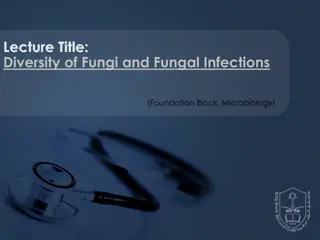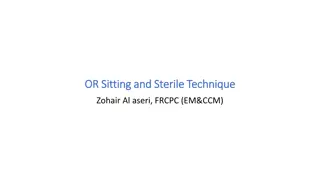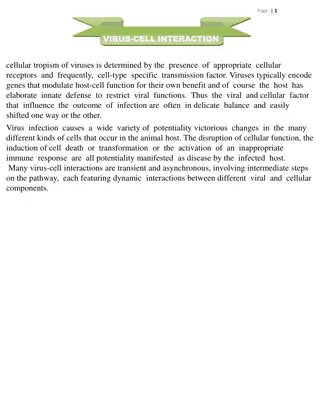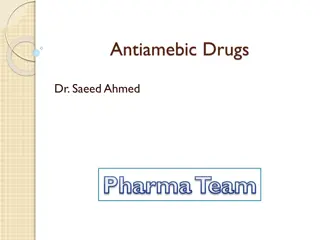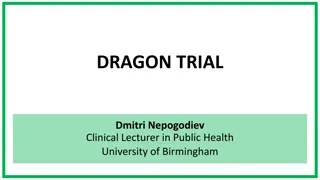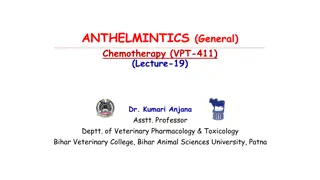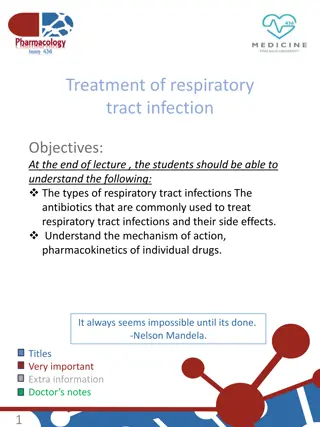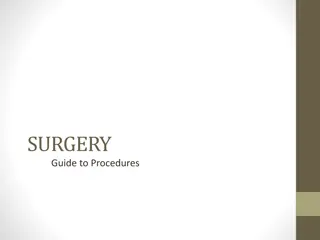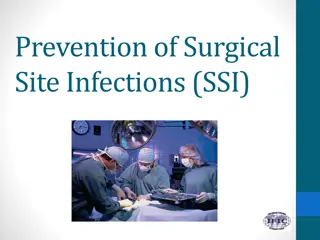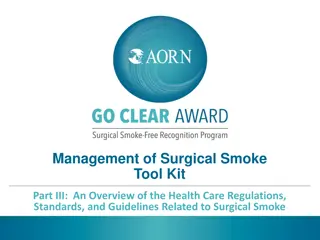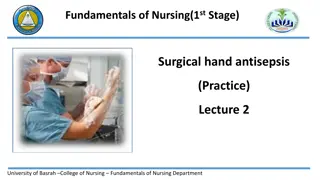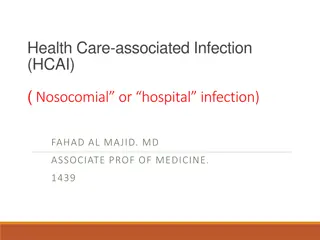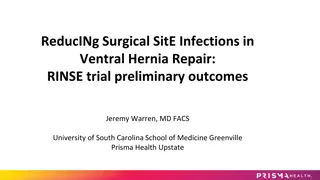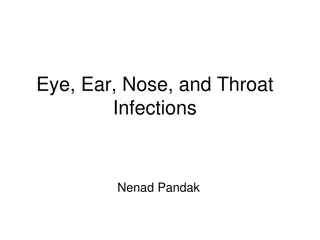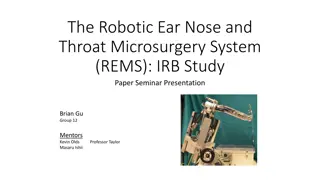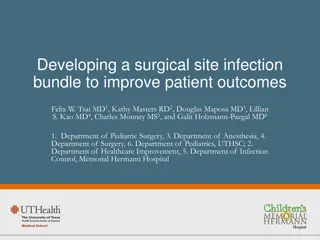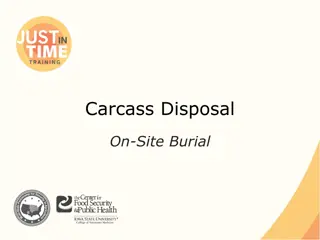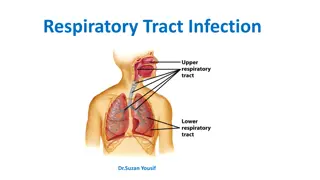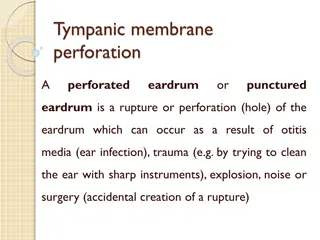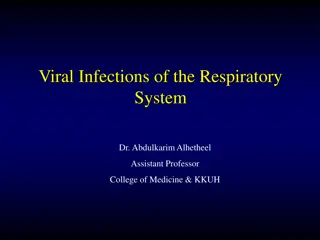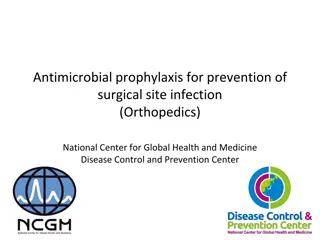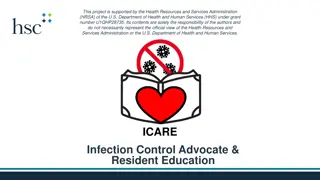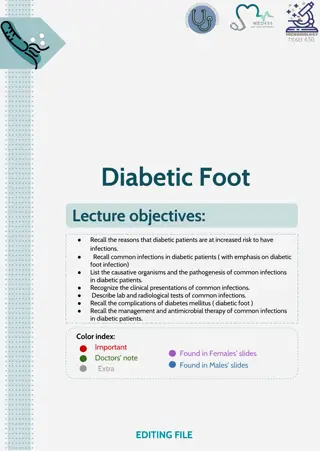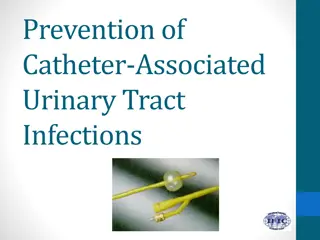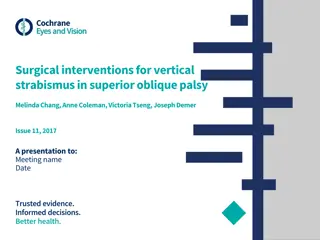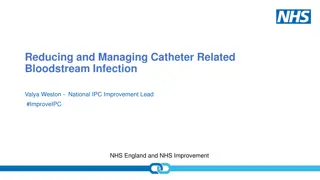Surgical Management of Hiatal Hernia
The history, advancements, and surgical options for durable hiatal hernia repair. Learn about the signs of symptomatic hiatal hernia and how modern repair techniques differ from prior surgical repairs.
13 views • 48 slides
Surgical Prophylaxis and Antimicrobial Selection Guidelines in Surgery
Surgical prophylaxis involves administering antibiotics before contamination of previously sterile tissues to prevent infections. Common pathogens in surgical site infections include skin flora like S. aureus. Antimicrobial selection is based on the surgical procedure, likely pathogens, and safety c
4 views • 19 slides
Understanding Anaemia and Infections in Relation to Health
Anaemia can result from various causes such as blood loss, increased destruction of red blood cells, and impaired production, often linked to infections and chronic diseases. Parasites, bacteria, and viruses play a role in the progression of anaemia, affecting the body's ability to produce and utili
3 views • 10 slides
Understanding Nontuberculous Mycobacteria Infections in Cystic Fibrosis
Nontuberculous mycobacteria (NTM) infections present a significant challenge in individuals with cystic fibrosis (CF). These infections are caused by over 200 species of atypical mycobacteria found in various environments. The CF-ID Clinic plays a crucial role in managing patients with multi-drug re
2 views • 25 slides
Periodontal and Peri-Implant Surgical Anatomy Overview
Sound knowledge of the anatomy of the periodontium and surrounding tissues is essential for successful periodontal and implant surgical procedures. This includes understanding the mandible and maxilla anatomy, muscles, anatomic spaces, and landmarks like the mandibular canal. Proper awareness can he
9 views • 41 slides
SURGICAL SITE INFECTION
Clinical scenario involving a 24-year-old male post-appendicectomy presenting with abdominal pain and concerns of wound infection. The tutorial discusses surgical wound infections, risk factors, prevention strategies, and principles of management, providing insights for approaching such cases as a s
7 views • 11 slides
Anaerobic Bacterial Infections: Overview and Clinical Implications
Anaerobic bacterial infections are caused by bacteria that do not require oxygen for growth, posing challenges in diagnosis and treatment. This article delves into the types of anaerobic bacteria, their role in human infections, and common clinical presentations such as abscess formation. Gram-negat
2 views • 24 slides
Moein Surgical Arts Spider Vein Surgery in Los Angeles
You're looking for one of the greatest spider vein surgeons in Los Angeles. The most advanced non-surgical and surgical spider vein treatments accessible today are the specialty of Moein Surgical Arts. If you need more information, please visit our website.
0 views • 7 slides
Colorectal Cancer Treatment in Wakad Pune - Dr. Manoj Dongare
Dr. Manoj Dongare is one of the best colorectal cancer specialist in Pune which handles each and every case with utmost care. In his surgical experience, he performs many colorectal cancer surgeries successfully. His expertise in colorectal cancer surgery and surgical oncology makes him one of the b
0 views • 3 slides
Overview of Genitourinary Tract Infections and STIs by Prof. Dr. Mete Kılcıler
Genitourinary Tract Infections and Sexually Transmitted Infections (STIs) are common conditions affecting both men and women. This article, presented by Prof. Dr. Mete Kılcıler from the Department of Urology at Bahçeşehir University School of Medicine, delves into the various aspects of UTIs, in
2 views • 47 slides
Understanding Fungi Diversity and Infections in Microbiology
Explore the world of fungi and fungal infections in this foundation block of microbiology. Learn about medically important yeasts, mold fungi, major fungal diseases, antifungal agents, and infection acquisition methods. Dive into hypersensitivity reactions, mycotoxicoses, and various types of fungal
1 views • 19 slides
Understanding Surgical Asepsis and Sterile Technique
Surgical asepsis and sterile technique are crucial in medical procedures to prevent infections. Principles, practices, and procedures ensure a sterile environment for invasive procedures. This involves maintaining asepsis and sterile conditions in operating rooms and other medical settings. Healthca
0 views • 50 slides
Understanding Virus-Cell Interactions and Infections
Viral infections exhibit diverse cellular tropism based on receptor interactions, impacting cell function through modulation and potential host defense responses. Infections can lead to various outcomes, from cell death to persistent or latent states, with nuanced effects on cellular behavior. Diffe
0 views • 8 slides
Understanding Antiamebic Drugs: A Guide to Managing Protozoal Infections
Protozoal infections, such as amebiasis, are a significant concern globally. In underdeveloped regions and beyond, these infections pose challenges due to inadequate sanitation and hygiene practices. Antiamebic drugs are essential for treating conditions like amebiasis, caused by Entamoeba histolyti
0 views • 40 slides
Importance of Surgical Head Coverings in Preventing Surgical Site Infections
Surgical head coverings play a crucial role in preventing surgical site infections by reducing the risk of microbial contamination and transmission in the operating room environment. Guidelines recommend covering the head, hair, and ears to minimize the shedding of microorganisms from surgical staff
0 views • 10 slides
DRAGON Trial: Green Surgery Research Programme Overview
Dmitri Nepogodiev, a Clinical Lecturer in Public Health at the University of Birmingham, leads the DRAGON Trial aiming to compare the effectiveness and sustainability of reusable versus single-use drapes and gowns in surgical settings. With a focus on reducing surgical site infections, carbon footpr
0 views • 9 slides
Understanding Anthelmintics: Drug Therapy for Parasitic Worm Infections in Veterinary Medicine
Anthelmintics are essential drugs to combat parasitic worm infections in animals. They work either by killing (vermicide) or expelling (vermifuge) the worms, reducing worm burdens and controlling infections. This comprehensive overview covers different aspects of anthelmintics, including their prope
2 views • 34 slides
Understanding the Treatment of Respiratory Tract Infections: Antibiotics and Management
This lecture covers the classification of respiratory tract infections and the antibiotics commonly used to treat them. It highlights the types of infections caused by viruses and bacteria, along with their respective treatments. The mechanism of action and pharmacokinetics of antibiotics, such as p
0 views • 7 slides
Comprehensive Guide to Surgical Procedures Preparation
This detailed guide provides step-by-step instructions on patient preparation for surgical procedures, including patient prep, setting up sterile fields, and prepping the operative site. It covers essential aspects such as emplacing a tourniquet, washing the wound, performing preoperative irrigation
1 views • 40 slides
Prevention of Surgical Site Infections: Key Factors and Recommendations
Surgical site infections (SSIs) are a significant concern in healthcare settings, with 25% of healthcare-associated infections being SSIs. They are preventable, but still pose challenges due to multifactorial causes. Risk factors include uncontrolled diabetes, obesity, smoking, and length of preoper
2 views • 28 slides
Overview of Health Care Regulations and Standards for Surgical Smoke Management
This part of the surgical smoke management toolkit provides an overview of the health care regulations, standards, and guidelines related to surgical smoke. It covers various organizations such as AORN, ANSI, ECRI, IFPN, The Joint Commission, CDC, NIOSH, and OSHA, emphasizing the importance of contr
0 views • 17 slides
Surgical Skin Preparation: Importance and Best Practices
Surgical skin preparation is crucial to reduce microbes and prevent surgical site infections. It involves thorough cleansing to eliminate dirt, oils, and microbes while minimizing the risk of infection. Methods include mechanical friction and using antiseptic solutions like alcohol, iodine, and chlo
0 views • 34 slides
Surgical Hand Antisepsis in the Operating Room Setting
Achieving effective surgical hand antisepsis is crucial in the operating room to reduce the risk of surgical site infections. This involves using antimicrobial agents and sterile brushes to remove debris and microorganisms, reduce microbial counts, and prevent rapid growth. The process requires equi
0 views • 21 slides
Understanding Health Care-associated Infections (HCAI) in Hospital Settings
Health care-associated infections (HCAI), also known as nosocomial or hospital infections, are infections that occur in patients during their hospital stay or after discharge. These infections can result from various sources, including colonization by microorganisms and exposure to contaminated envi
0 views • 48 slides
Preliminary Outcomes of RINSE Trial for Reducing Surgical Site Infections in Ventral Hernia Repair
Jeremy Warren, MD, FACS from the University of South Carolina School of Medicine Greenville shares the preliminary outcomes of the RINSE trial aimed at reducing surgical site infections in ventral hernia repair. The trial explores the use of antibiotic irrigation and its effectiveness in decreasing
0 views • 16 slides
Overview of Eye, Ear, Nose, and Throat Infections by Nenad Pandak
In this comprehensive guide by Nenad Pandak, various aspects of eye, ear, nose, and throat infections are discussed. The content covers infections such as conjunctivitis, keratitis, pharyngitis, otitis media, and sinusitis. It also delves into causes, clinical presentations, and diagnosis of these i
0 views • 68 slides
Robotic Surgical Skill Evaluation in Sinus Surgery: A Comprehensive Study
The REMS project focuses on robotic ear, nose, and throat microsurgery systems, with one sub-project aiming to validate if robotic assistance enhances surgical skill compared to traditional methods. A key paper by Ahmidi et al. explores robotic path planning for surgeon skill evaluation in minimally
0 views • 23 slides
Developing a Surgical Site Infection Bundle for Improved Patient Outcomes
Developing a comprehensive Surgical Site Infection (SSI) bundle to reduce infection rates, including interventions like preoperative chlorhexidine baths, standardized antibiotic protocols, and targeted prophylactic measures. By implementing these strategies, the aim is to lower infection rates below
0 views • 24 slides
On-Site Burial for Carcass Disposal: Methods and Environmental Impacts
Explore the process of carcass disposal through on-site burial, covering topics such as trench burial, site selection, construction and design considerations, environmental impacts, and a comparison with other disposal methods. Learn about key factors influencing on-site burial, including soil prope
0 views • 13 slides
Understanding Respiratory Tract Infections: Causes and Prevention
Respiratory tract infections are commonly caused by viruses, bacteria, rickettsia, and fungi, leading to various health issues. These infections can be transmitted through droplets, droplet nuclei, and dust, emphasizing the importance of maintaining respiratory health through specific and non-specif
0 views • 34 slides
Surgical Treatment and Complications in Gynecology: Review of Methods and Outcomes
Exploring the complexities of gynecological surgical procedures, this content delves into historical perspectives on prolapse and incontinence surgeries, the efficacy of various treatment approaches including weight management and surgical interventions like TVT, and the evolution of surgical techni
0 views • 26 slides
Understanding Tympanic Membrane Perforation: Causes, Symptoms, and Management
A tympanic membrane perforation, or perforated eardrum, can result from various factors such as infections, trauma, loud noises, or surgery. It presents with symptoms like pain, hearing changes, and ear fullness. Different types of perforations exist, and diagnostic procedures include history collec
0 views • 18 slides
Understanding Viral Infections of the Respiratory System
Respiratory viral infections are common and primarily caused by viruses, leading to morbidity and time off work. They can range from mild upper respiratory tract infections to severe lower respiratory tract infections like pneumonia. Various viruses like influenza, parainfluenza, respiratory syncyti
0 views • 23 slides
Antimicrobial Prophylaxis for Surgical Site Infection Prevention in Orthopedics
Surgical site infections (SSIs) are common and costly healthcare-associated infections, accounting for a significant percentage of nosocomial infections. Defined by the CDC, SSIs occur within 30 days of surgery and have clinical criteria such as purulent exudate, positive cultures, or surgeon diagno
0 views • 10 slides
Understanding Common Infections in Nursing Home Residents
Explore the causes, types, and impact of infections in nursing home residents while learning how to prevent and control infections. Discover common infections, factors contributing to infections, and resident rights in infection control practices.
0 views • 23 slides
Understanding Diabetic Foot Infections and Associated Risks
Diabetic patients are prone to infections, significantly impacting morbidity and mortality rates. Increased infection risk is due to both host-related and organism-related factors. Common infections in diabetic patients include skin and soft tissue infections, diabetic foot infections, respiratory t
0 views • 14 slides
Preventing Catheter-Associated Urinary Tract Infections
This presentation covers the prevention of catheter-associated urinary tract infections (CAUTIs) in healthcare settings. It highlights the significance of urinary tract infections, risk factors, preventive measures, and common microbiology involved. Key topics include the importance of urine collect
0 views • 34 slides
Surgical Interventions for Vertical Strabismus in Superior Oblique Palsy: A Review
Binocular misalignment in superior oblique palsy often requires surgical interventions to address vertical strabismus, which can lead to visual issues and neck muscle problems. This review assessed the effects of various surgical treatments on individuals with this condition. Despite limited data pr
0 views • 10 slides
Managing Catheter-Related Bloodstream Infections in Vascular Access
Reduce and prevent catheter-related bloodstream infections in vascular access by addressing extraluminal infection sources and implementing strategies outlined in national drivers such as the NHS Long Term Plan and the Antimicrobial Resistance Action Plan. Recognize the importance of tackling antimi
0 views • 25 slides
Guidance on Intercollegiate Surgical Curriculum Programme Requirements
The Intercollegiate Surgical Curriculum Programme (ISCP) overseen by the Joint Committee on Surgical Training sets out annual requirements for surgical trainees, including assessments, feedback, and audits. Pitfalls to avoid include last-minute preparations and failing to reflect on learning experie
0 views • 9 slides
